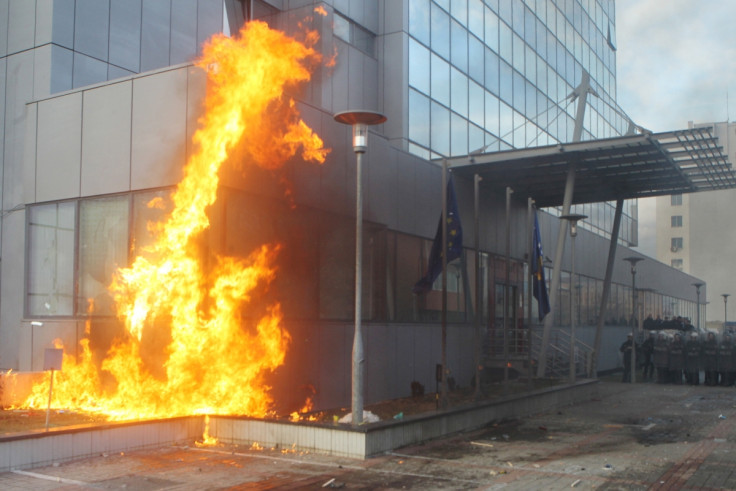Kosovo: Anti-government protests turn violent as 24 police officers sustain injuries

Around 28 people were hurt as demonstrators clashed with police in capital Pristina of the disputed south-eastern European country of Kosovo. Civilians were protesting against an accord, the Balkan country signed with its former ruler Serbia.
On 9 January, protesters set ablaze the government headquarters in Pristina, where 24 police officers and two journalists sustained injuries. Around 40 armed men were arrested and police confiscated knives and petrol bombs from them. Two police cars were destroyed, while public and private property were damaged, Reuters reported.
Several of the demonstrators, including Kosovo Albanians believe that the accord with Serbia is a threat to Kosovo's hard-earned sovereignty, now recognised by more than 100 countries including major western powers. Violence broke out at the end of a peaceful rally attended by thousands of people, who demanded that the Kosovo government resign, as it had broken the country's constitution.
While striking a deal between Kosova and Serbia, the former's constitutional court decided to cede more powers to ethnic Serbs. The move, many called was not in line with the country's constitution.
Protesters hurled rocks and other objects at the police and the government building despite calls from organisers to disperse peacefully. Before police could intervene, they had set fire to the government headquarters.
Kosovo's government has accused opposition party leaders of organising the violence and attempting to drag the country into "crime and anarchy".
"The aim of this protest was to overthrow the government with violence and leave the country in the hands of the incriminated people that today set on fire the (government) building and police," Kosovo's government said in a statement.
Opposition parties said that they would continue to organise protests until the government resigns.
Commenting on the incident, Greg Delawie, US ambassador to Kosovo tweeted: "Political violence threatens democracy and all that Kosovo has achieved since independence." US is the biggest supporter of Kosovo's independence.
Meanwhile, the EU office in Kosovo condemned the " violence" and called for "calm and renouncement of violence" as the way forward for Kosovo.
The European country, which has a majority of Albanians, got independence from Serbia with western support in 2008. Serbia does not recognise its former southern province as independent. Now, both the countries are under pressure from the EU to normalise relations if they are to progress toward membership of the bloc, said Boston Herald.
© Copyright IBTimes 2024. All rights reserved.





